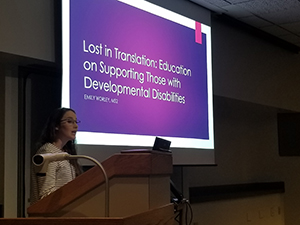Kansas LEND: Working for Better Health Care for Persons with I/DD
November 25, 2019

|
Although 1 in 6 persons in the United States has an intellectual or developmental disability (IDD), as a population they are an under-served community. Research shows that people with IDD have a hard time finding competent medical providers, have a higher rate of chronic conditions such as cardiovascular disease, and are less likely to receive routine health screenings.
In September LEND faculty presented at the Kansas Public Health Association Meeting on advocacy and health initiatives at both the national and state level. LEND faculty reviewed the HEADs Up Act of 2018 (Healthcare Extension and Accessibility for Developmentally Disabled and Under-served Populations). Faculty then reviewed the Association of University Centers on Disabilities. Keep The HEAT on (Health is for Everyone Action Team) which builds on successful adoption of the American Medical Association's (AMA) resolution to include education about the unique needs of people with IDD at undergraduate, graduate, and continuing medical education for physicians.
Finally, LEND faculty introduced the toolkit for public health professionals from AUCD's National Center on Disability in Public Health. In October, Emily Worley, 1st year medical student and LEND Medium Term Trainee presented the results of an online, cross-sectional questionnaire designed to examine the efficacy of the University of Kansas' health care education programs on preparing future physicians to care for those with developmental disabilities. The questionnaire was modeled after the 6 core competencies developed by the Alliance for Disabilities in Health Care Education concerning basic skills that should be obtained before completion of a graduate level health care program. Ms. Worley found that medical students do not feel that they are meeting competency requirements during their medical training. Ms. Worley is working on a video with the Kansas Self-Advocate Coalition that has persons with developmental disability talk about their experiences with the health care system and we anticipate using this with a wide variety of trainees in health care professions.







